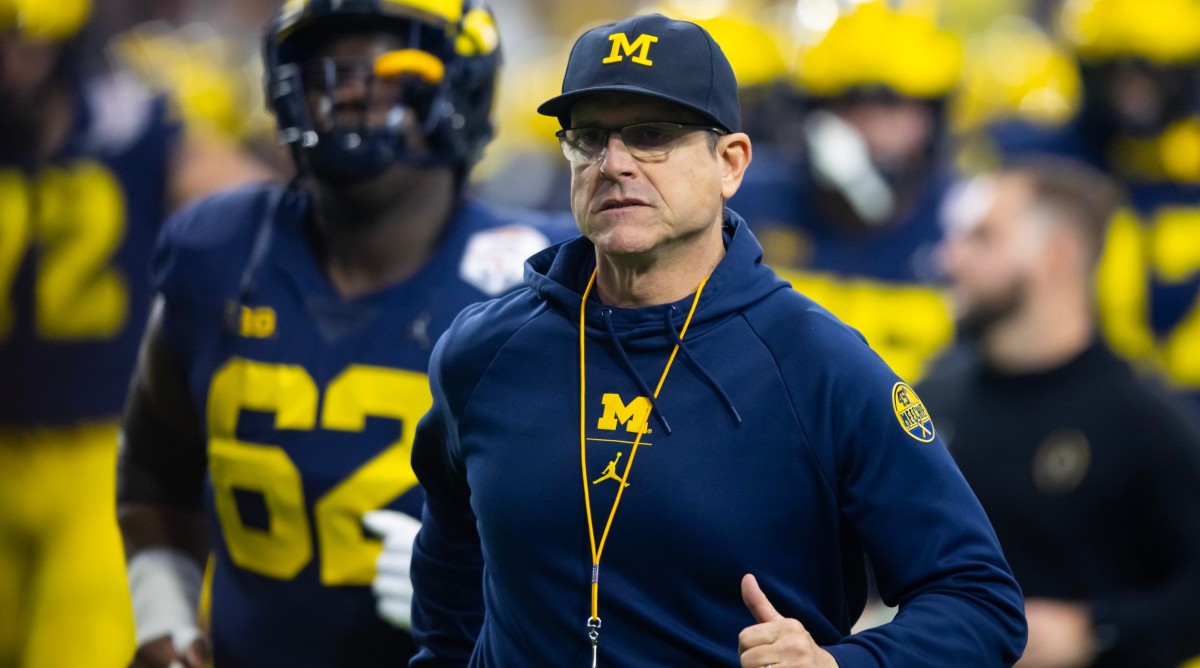NCAA Investigating Michigan for Potential ‘Sign-Stealing’ Rules Violation
NCAA Enforcement is investigating whether Michigan football violated rules prohibiting “sign stealing,” the Big Ten Conference confirmed Thursday. Multiple sources told Sports Illustrated the alleged violations involved impermissible in-person scouting. Yahoo Sports reported the news first.
The NCAA prohibited in-person scouting of opponents in 1994, but sources said Michigan has allegedly sent personnel to games to try to glean play signals from future opponents. Sign-stealing is not technically an NCAA violation, but using staff or other assigned personnel to attend games would be against the rules. Sources said that was the issue with the Wolverines.
A staffer with one of the teams Michigan played this season told SI, “We had an inclination before we played them that they were sending advance scouts and videoing signals.”

Michigan head coach Jim Harbaugh issued a statement on Thursday denying any wrongdoing:
I want to make it clear that I, and my staff, will fully cooperate with the investigation into this matter.
I do not have any knowledge or information regarding the University of Michigan football program illegally stealing signals, nor have I directed any staff member or others to participate in an off-campus scouting assignment. I have no awareness of anyone on our staff having done that or having directed that action.
I do not condone or tolerate anyone doing anything illegal or against NCAA rules.
No matter what program or organization that I have led throughout my career, my instructions and awareness of how we scout opponents have always been firmly within the rules.
Pursuant to NCAA rules, I will not be able to comment further while this investigation takes place.
Harbaugh’s statement followed one earlier in the day from a Michigan spokesperson, which acknowledged the university’s awareness of the NCAA’s investigation into sign-stealing. “The university is fully cooperating with the Big Ten and NCAA,” the spokesperson said. “The investigation is ongoing and Saturday’s game will continue as planned. At the University of Michigan, we are committed to the highest ethical and integrity standards for all members of our community.”
One source told SI that if the Michigan investigation identifies any violation as a playing rules issue, depending on the situation, the NCAA would defer to the Big Ten office, or it will be addressed by the NCAA’s secretary rules editor, which for football is Steve Shaw. A second source tells SI that in the case of a playing rules issue, the first entity given an opportunity to address it and apply any corrective or punitive measures would be Michigan itself, followed by the conference. But there is no defined penalty within the rulebook.
If a violation is identified as a bylaw issue, the case would likely proceed through the traditional infractions process. The NCAA bylaw in question is 11.6.1, which prohibits off-campus, in-person scouting of future opponents.
A source with experience in football rules enforcement said that allegations similar to what Michigan is facing are not unheard of. Schools have periodically complained to their league offices about opponents who stole signs via various means. In many of those cases, conference administrators will take the matter to the school accused of wrongdoing and ask them to address it.
The unusual element in this case is that it became public, and seemingly very quickly after allegations were made against Michigan.
This potentially complicates another situation surrounding Harbaugh. A Michigan source confirmed Wednesday night what author John U. Bacon reported earlier this month: The school is preparing to offer its head coach a contract extension that would make him at least the highest-paid coach in the Big Ten. (Ohio State head coach Ryan Day will make $10.2 million this season.) In a perfect world, the deal would be done before the stretch run of Michigan’s season begins Nov. 11, when the Wolverines play Penn State.
If he doesn’t sign with deliberate speed, it may signal another dalliance with the NFL. If the Chargers continue to underwhelm, there would be a line a mile long of coaches waiting to replace Brandon Staley considering the opportunity to work with a QB as talented as Justin Herbert. Harbaugh played for the franchise when it was in San Diego and had an early head-coaching stop at the University of San Diego. When he signed an extension in early 2022, Harbaugh said he assured Michigan AD Warde Manuel that his most recent flirtation with the league after the ’21 season would be his last.
When asked whether he would sign an extension sooner rather than later in early October, Harbaugh said: “Yeah, I mean, like anybody, you want to be somewhere where you’re wanted. And when they like what you do and how you do it, they tell you that. Your bosses tell you that, and then that gets reflected in a contract. But bottom line, any of us, right, that’s where we want to be. Somewhere where they like how you do it and what you do.”
It’s unclear how, if at all, this new NCAA probe may alter progress on that front.
Michigan already is under NCAA investigation for alleged violations regarding recruiting during the COVID-19 dead period in 2020. Harbaugh allegedly met with recruits. Additionally, he allegedly had more than the allowed limit of coaches at practice and watched player workouts via zoom.
Michigan suspended Harbaugh for the first three games of this season after a negotiated resolution between the school and the NCAA for a four-game suspension reached an impasse. The case is expected to go before the NCAA Committee on Infractions after the season, likely in 2024.
